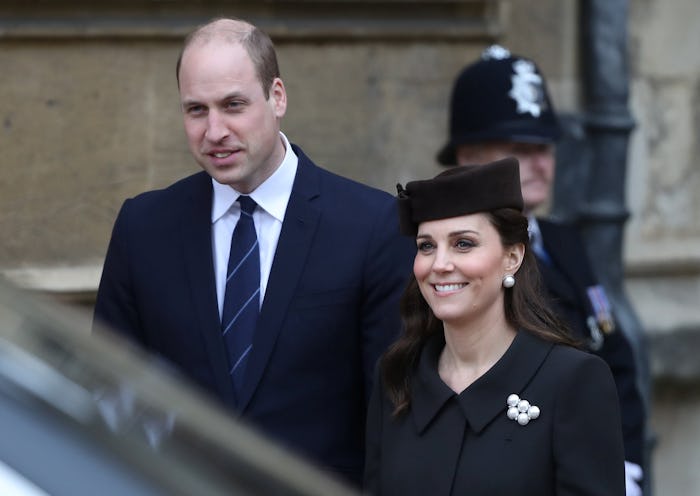Entertainment

Here Are The Chances Of Kate Middleton & Prince William's Third Baby Ending Up On The Throne
There is nothing more fascinating than the British royal family, with all of their amazing traditions and castles. But it can be confusing to follow the line of succession in 2018, especially since we don't have a monarchy here in the U.S. So how do these titles work, anyway? Will Kate Middleton and Prince William's third baby be king now that he's been born or will he be given some other royal title?
If the third baby was the only child Prince William had, he would have a shot at the throne one day, but these days, it would actually take a whole lot of Shakespearean style tragedy for any one of William and Kate's children to become King or Queen one day. But for the sake of always being prepared, let's dig in and see what it would take.
For someone to become King or Queen, it means that 92-year-old Queen Elizabeth II first has to die or abdicate her position. Of course, it's bound to happen one day, and there are even rumors that she's planning on abdication at 95 years old, barring any emergencies. So, there's just three short years before anything gets set in motion. When it happens, her 69-year-old son, Prince Charles, William and Harry's father, will be king. Once he dies, William will take the crown.
Because of the rules of succession, once William takes the throne, his kids are first in line to secede him. It skips his younger brother, Harry, altogether, even if he has kids, which is sort of wild.
There has been one big change to the succession rules, though. As much as the British monarchy might seem old fashioned, Queen Elizabeth made a huge, feminist move back in 2011 that changed the way the royal family does things forever and ever.
She did two things, actually. The first was to make it so that family members didn't have to ask her for permission to marry and that they could marry someone from outside the Church of England. But more importantly, Queen Elizabeth created the Succession to the Crown Act of 2013, which allows Charlotte to keep her place in line for the throne, according to The Sun.
Previously, the only way a woman could become the monarch was if the king before had no sons (which is how Queen Elizabeth became queen in 1952). Before the change, William's daughter Charlotte would have been skipped over by her new baby brother, but now she'll be counted as an heir to the throne, too. Former Prime Minister David Cameron said at the time, according to The Washington Post:
The great strength of our constitutional approach is its ability to evolve. Attitudes have changed fundamentally over the centuries, and some of the outdated rules, like some of the rules of succession, just don’t make sense to us any more. The idea that a younger son should become monarch instead of an elder daughter simply because he is a man, or that a future monarch can marry someone of any faith except a Catholic — this way of thinking is at odds with the modern countries that we have become.
So, first William would become king, then George, then Charlotte, and then this third child. But that's a lot of people and we're obviously hoping everyone lives long and fruitful lives. What's most likely to happen is that George will have children of his own, and then they would be added to the line of succession. The same goes for Charlotte and the new baby's children, way before it would ever jump to Prince Harry and Meghan Markle's kids.
That's the long answer, but the short answer is mostly — yes, Prince William and Kate Middleton's third child could be king. But it would take a lot of loss to get there, so don't hold your breath for that to happen. In any case, he'll likely be able to do great things all the same, whether he wears the crown or not.
Check out Romper's new video series, Bearing The Motherload, where disagreeing parents from different sides of an issue sit down with a mediator and talk about how to support (and not judge) each other’s parenting perspectives. New episodes air Mondays on Facebook.